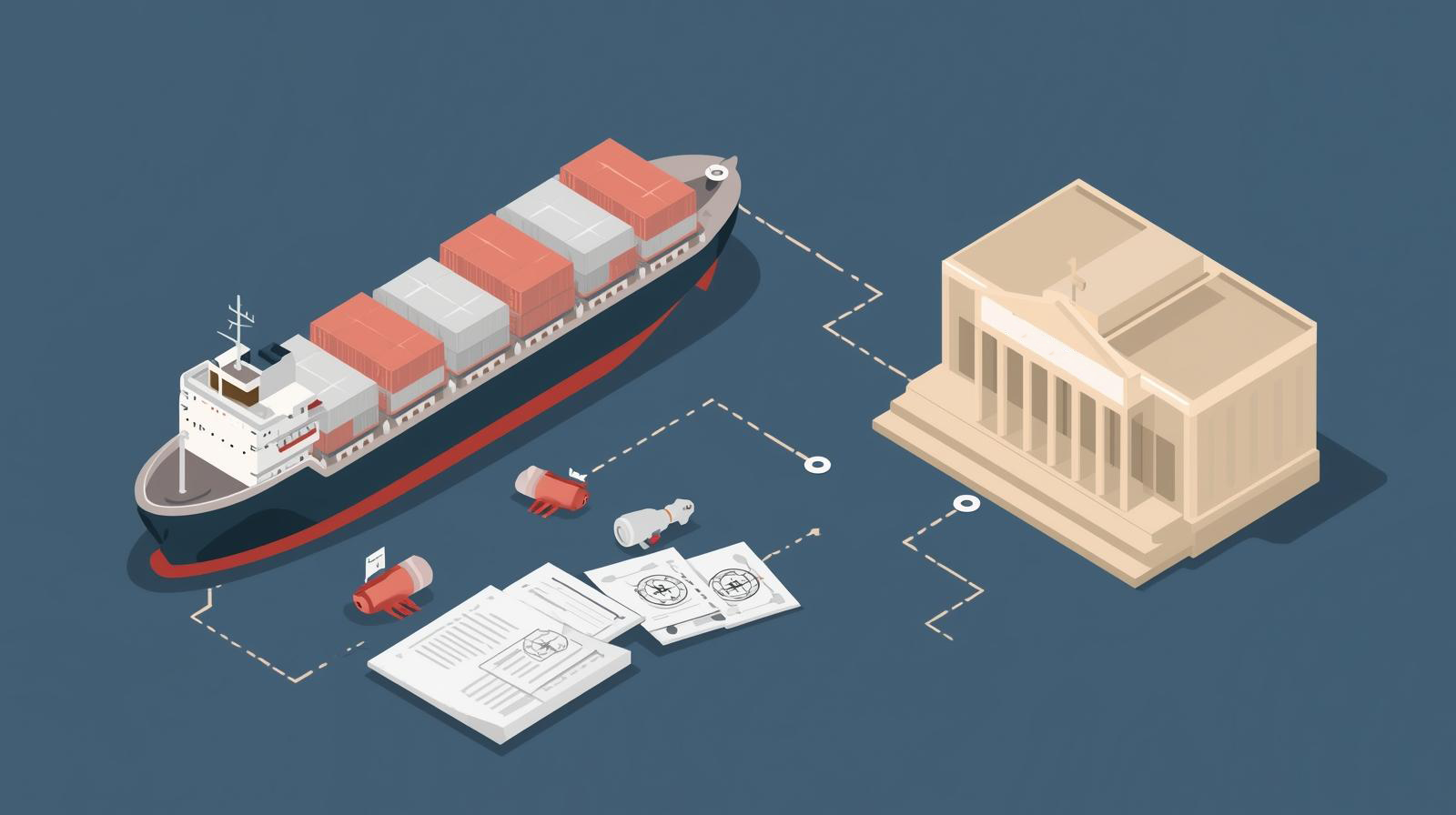share this article
Ship arrest in Iran is a powerful remedy for maritime creditors seeking to secure their claims against vessels calling at Iranian ports. While the process shares similarities with arrest procedures under international maritime conventions, its practical execution depends heavily on Iranian civil procedure, local judicial discretion, and adherence to evidentiary formalities.
This guide by MJK Law Firm’s Maritime Practice provides a practitioner-level roadmap to arresting a vessel in Iran — from establishing jurisdiction and preparing the petition to managing counter-security, obtaining the arrest order, and navigating post-arrest proceedings.
Legal Framework for Ship Arrest in Iran
Iran’s maritime arrest procedure is primarily grounded in the Iranian Maritime Law (articles 59–70) and the Civil Procedure Code (CPC) — especially Articles 108 to 110, governing provisional and conservatory measures.
Although Iran is not a party to the 1999 Arrest Convention, the domestic framework incorporates similar principles of maritime lien and claim preservation. Iranian courts have wide discretion to issue temporary detention orders when the claimant demonstrates:
- Prima facie evidence of a maritime claim;
- A risk of vessel departure before satisfaction of the claim; and
- Sufficient counter-security to cover potential wrongful arrest damages.
The competent authority is the Maritime Court or the Civil Court of First Instance in the port’s jurisdiction — e.g., Bandar Abbas, Bushehr, Khorramshahr, or Chabahar.
Jurisdiction and Court Competence
The Iranian courts obtain jurisdiction based on:
- The vessel’s location within Iranian territorial waters or ports;
- The maritime claim’s connection to Iran (e.g., bunkers supplied in Iran, collision, damage to cargo, and unpaid demurrage for Iranian port stay).
- Registered agent or representative present in Iran.
For foreign-flagged ships, the arrest can be sought even without the owner’s domicile in Iran, provided the vessel is physically within Iranian jurisdiction.
Read more
Required Documents and Filing Checklist
When filing for an arrest, practitioners must prepare a comprehensive evidentiary file. Incomplete submissions can delay or derail urgent applications. The standard checklist includes:
- Statement of claim (petition for arrest and main claim, if available).
- Evidence of the maritime claim, such as:
- Charterparty or bill of lading;
- Invoices or bunker delivery notes;
- Surveyor’s report (in damage cases).
- Vessel identification: name, IMO number, flag, and port of call.
Proof of urgency: AIS data or port schedule indicating imminent departure. - Applicant’s legal status: power of attorney and company registration documents.
- Suggested amount of counter-security and supporting justification.
- Translation: all foreign documents must be officially translated into Persian and certified by Iran’s Judiciary Translation Office.
Step-by-Step Procedure

1. Drafting and Filing the Petition
The claim is filed before the Civil Court of First Instance at the relevant port. Practitioners often combine the main claim (for the debt or damages) with a motion for provisional arrest, citing Articles 108–110 CPC.
The petition must articulate:
- The nature of the maritime claim;
- The necessity of provisional arrest to prevent loss of recovery; and
- The proposed amount of counter-security.
2. Judicial Review and Counter-Security Decision
Upon submission, the court typically reviews the petition within days. Judges often hold an informal hearing with the applicant’s lawyer to assess the risk of flight and the adequacy of evidence.
The court will set a counter-security amount, usually 10–20% of the claimed sum, payable as a cash deposit or bank guarantee. In practice, Iranian courts favor cash guarantees lodged in rials with the court’s treasury account.
3. Issuance of the Arrest Order
Once counter-security is deposited, the court issues a temporary detention order. The order is immediately transmitted to:
- The Port and Maritime Organization (PMO) of Iran,
- The Coast Guard, and
- The Port Authority Office at the vessel’s berth.
The vessel cannot depart until the court lifts the detention.
4. Notification to Parties and Enforcement
Court clerks, accompanied by the PMO officers, serve the arrest order on the vessel’s master and port authorities. A copy is also provided to the P&I club correspondent (if known).
Enforcement officers physically seal the vessel’s clearance documents, effectively preventing departure.
5. Security for Release
The owner may seek release by depositing:
- Bank guarantee equal to the claim amount (subject to court approval), or
- Cash security in local currency.
Once the substitute security is accepted, the court orders the vessel’s release and retains jurisdiction over the main claim.
Counter-Security Practice in Iran
Counter-security is a defining feature of Iranian provisional measures. While not expressly maritime-specific, courts apply Article 108 CPC strictly.
Key practice points:
- The form of counter-security (cash, bank guarantee, or certified check) is determined by the judge.
- Foreign currencies are generally not accepted; deposits must be in Iranian rials.
- Where claims involve foreign parties, courts may demand higher counter-security to deter wrongful arrest.
- In practice, judicial officers often calibrate counter-security to ensure it remains proportionate — excessive deposits can be challenged on appeal.
Timelines and Practical Considerations
| Stage | Typical Duration | Notes |
| Petition filing to court review | 1–2 days | May extend if translation pending |
| Counter-security deposit | Same day | Immediate deposit required |
| Issuance of an arrest order | Within 24 hours of deposit | Urgent orders often issued same day |
| Notification and enforcement | 1 day | PMO cooperation critical |
| Release upon security | 1–2 days after acceptance | Subject to verification |
Practitioners should anticipate delays at the port administration level, particularly during weekends or public holidays (Thursday–Friday). Real-time liaison with the PMO Legal Affairs Department is essential to prevent procedural stagnation.
Common Pitfalls and Risk Mitigation
- Insufficient documentary evidence: Courts require tangible proof of claim; unsigned emails or draft invoices are inadequate.
- Delay in filing translations: Iranian courts will not process foreign documents without a certified Persian translation.
- Improperly calculated counter-security: Requesting an unrealistically low deposit can undermine credibility.
- Failure to coordinate with port authorities: Practical enforcement hinges on cooperation with the PMO.
- Ignoring post-arrest deadlines: The claimant must pursue the main action within the time frame set by the court (commonly 10–20 days), or the arrest lapses automatically.
MJK Law Firm’s Approach to Vessel Arrests

At MJK Law Firm, our maritime team combines procedural precision with practical familiarity with Iranian port operations. We have acted for shipowners, charterers, and P&I clubs in vessel arrests and releases across Bandar Abbas, Bushehr, Kharg Island, and Chabahar.
Our approach emphasizes:
- Rapid evidence assessment and pre-filing strategy;
- Optimized counter-security presentation.
- Coordination with PMO and Coast Guard for immediate enforcement;
- Tactical negotiation for release and settlement;
- Continuous monitoring of the vessel’s legal and physical status.
Frequently Asked Questions (FAQs)
1. Can a foreign claimant arrest a ship in Iran?
Yes. Iranian law does not require the claimant to be domiciled in Iran. The only jurisdictional condition is that the vessel must be within Iranian waters or ports at the time of filing.
2. What happens if the arrest is found wrongful?
If the claim fails, the vessel owner may recover damages from the claimant’s counter-security deposit, under Article 110 CPC.
3. How long does a ship remain under arrest?
Until the court accepts substitute security or the main claim is resolved. Temporary detention typically lasts a few days to weeks, depending on proceedings.
4. Can bunker suppliers or agents file arrest petitions?
Yes, provided they demonstrate a contractual link with the owner or charterer giving rise to a maritime claim under Articles 59–70 Maritime Law.
5. Are there emergency courts for ship arrest?
While no specialized emergency court exists, maritime sections of civil courts maintain on-duty judges who can issue urgent detention orders within 24 hours.
Conclusion
If you are a shipowner, charterer, or maritime creditor facing an urgent dispute in Iranian waters, immediate procedural action is critical.
MJK Law Firm’s Maritime Department provides comprehensive support in vessel arrests, releases, and maritime litigation across all major Iranian ports.
📞 Contact our maritime lawyers in Iran to safeguard your interests and ensure compliant, strategic vessel arrest execution.
